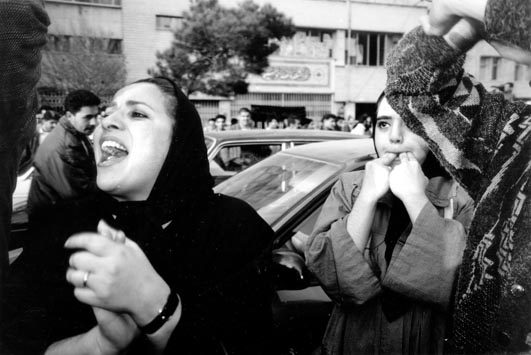|
I. The Past
I will begin with a tale. Its plot
centers on a
woman and poet known as Tahereh. Tahereh was not her real name; it
was the title bestowed on her by Bab, a religious leader and the precursor
of the Baha'i faith in Iran. It means "the pure."
Tahereh was born in Qazvin, Iran, in 1814, to a well-known and influential
clerical family.
She lived at a time in Iran when clerics and depots shared
power and the "law" was religious law. Perhaps
the best way to judge that time is by its rules regarding
women. Women were veiled from head to toe, and when
talking to men who were not members of their immediate family or
their husbands, they had to hide behind a curtain.
Polygamy was an accepted practice, women's age of consent for
marriage was nine, the punishment for adultery was death by
stoning, and women's public education was banned.
Because of her father's enlightened views, Tahereh and her
sister were allowed to continue their studies under his and his
brother's tutelage. Tahereh's exceptional talent and zeal
for knowledge matched her extraordinary beauty. Despite
the high degree of her scholarship and attainments, she was
given in marriage to her cousin at the age of 14. Marriage
to a husband from an orthodox and highly religious family, and
the birth of two sons, did not deter Tahereh from her studies.
As a result of those studies, she became attached to the
teachings of the most controversial religious leaders of her
time, the Babis. At a time when women were not allowed to leave
their house without their husband's permission. Tahereh
left her husband and family and became one of the Babi movement's
most effective and outspoken leaders. She urged radical
changes in religious doctrines that she insisted must change and
be renewed with time. She was so effective an orator that
wherever she went she gathered large followings, especially
among women.
The followers of Bab and later of Bahaullah posed a dangerous
threat to Iran's powerful Islamic clergy, and Tahereh became a
particular threat. In the year 1848, at a gathering of
babi followers in the hamlet of Badasht, Tahereh appeared
unveiled, and abrogating the laws of Islam, proclaimed the
advent of a new faith. "Consternation immediately
seized the entire gathering....To behold her face unveiled was
to them inconceivable." Many men escaped in horror,
and one slashed his throat at such an act of sacrilege by a
woman. It was then that the Babis announced their
independence from Islam, and proclaimed their faith as a new
faith.
Tahere's unveiling became synonymous with the abrogation of
Islamic law. To the followers of her abandoned faith she
was worse than a heathen; she was a heretic, the evil
"Other" who had betrayed her own. To her
followers she was an enigma, a puzzle to be worshipped without
being understood.
Not surprisingly, Tahereh was soon put under house
arrest. The tale ends with her death. The
government, too apprehensive about executing her publicly,
secretly planned her death and had her strangled.
This article is not about Tahereh's Babi movement.
Rather it is about Tahereh's great granddaughters and great
great granddaughters living in a country now called the Islamic
Republic of Iran (Islamic Republic). Tahereh's legend is
the context that will make these women's lives understandable.
The image of Tahereh in Badasht now haunts the Islamic
Republic. As an Iranian woman living in the Islamic
Republic until 1997, I often felt that a time warp had occurred
and I was back to living in Tahereh's times. Understanding
women's lives in the Islamic Republic and their resistance to
fundamentalism starts with understanding the past, and in
finding answers to the questions raised by Tahereh's tale:
Why did Tahereh have to be taken away and killed secretly?
What danger did a single woman present to those powerful
men? Why did a man kill himself because she lived the way
she did?
Continued on the next
issue..........................
|

